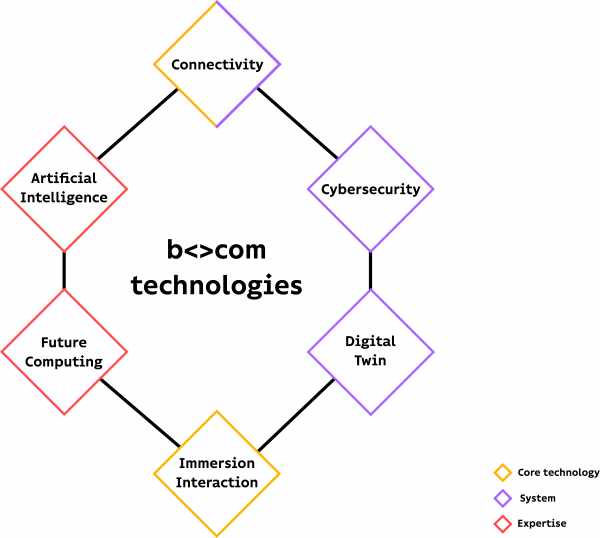b<>com unveils its strategic plan to 2035. The IRT’s ambition during this next chapter is to become a respected leader for its ability to reconcile research, innovation and sustainable development.
With that in mind, it is embracing an approach that is still relatively uncommon in the research community: referring to the UN’s 17 Sustainable Development Goals (SDGs) to guide its research projects and the design of tomorrow's digital technologies. b<>com's work will be organized around six technological pillars, for a more responsible digital environment that contributes to business sustainability.
"This 2035 ambition renews our core values and our overriding purpose. We need to shift from accelerating innovation to accelerating transition. This roadmap should take us to a higher level of execution and performance, for the benefit of sustainable innovation. It chimes perfectly with the France 2030 national strategy and the plans of our local areas.”
Towards sustainable digital innovation
A strong ambition has driven b<>com’s development from the outset: to innovate for the common good. In 2022, the IRT celebrated its tenth anniversary with all of its partners: this symbolic milestone has given rise to a collective forward-thinking process spanning more than two years. In light of the tangible impacts of climate change, the IRT wanted to broaden its initial vision by accelerating its contribution to the development of a sustainable digital industry, backed by its committed member investors.
b<>com is thus poised to step up its actions to meet the challenges of France's digital sovereignty, future digital uses, and market demand, while shaping its technological roadmap grounded in the Sustanaible Development Goals (SDG). In practice, that will mean implementing a new working methodology within the IRT, which factors in sustainable innovation as a source of creativity, and not just as a constraint, right from the inception phase of research projects.
b<>com is currently designing two dedicated tools: a new project set-up process incorporating sustainable IT is set to be finalized in September 2023. And, by the end of the year, new Key Value Indicators will be added to our traditional KPIs. This new methodology comes with a training program designed to enable all IRT employees to get personally to grips with the challenges of sustainable IT.
Six key technological pillars to meet the transition challenges
b<>com's future work will be organized around 6 major technological pillars. These six families of digital technologies bring together an already extensive range of expertise at b<>com and form its pillars for addressing the SDGs.
These are part of a forward-looking approach, imagining possible future scenarios.
These pillars are interdependent, informing each other: artificial intelligence and IT of the future, for example, are two areas of expertise that serve the other identified pillars.




